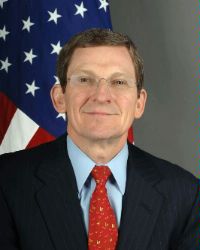
BY KELSEY LARSON
The most turbulent moments of the war in Afghanistan occurred between the years 2011 and 2012, as the US poured money and troops into the country in a massive effort to reach sustainable peace in Afghanistan by 2014. Marc Grossman, US Special Representative to Afghanistan and Pakistan during those years, offered insights on the diplomatic effort behind that surge this Monday afternoon/evening to an audience of students and faculty in Luce Auditorium.
Grossman explained that the work done to create a more peaceful Afghanistan didn’t only happen within the country’s borders. As US Special Representative to Afghanistan and Pakistan, Grossman orchestrated a “diplomatic surge” to complement the military and civilian ones. This surge worked to create a structure supported by the international community whereby Afghanistan could develop into a prosperous country. Grossman emphasized the close ties between economic development and peace, stating that “the more people who have jobs, the less people who will be seduced by radicalism.”
And in his view, the most important key to Afghanistan’s future economic growth will be the development of private enterprise. Grossman focused on two vital drivers of economic growth, opening trade and establishing a rule of law. To that end, the American diplomatic team worked on a diverse set of trade initiatives, including a “new Silk Road” to open the flow of goods and capital throughout Central Asia. He spotted opportunities for diplomatic intervention in working with India to allow more trade to flow through Pakistan and give Afghan firms access to India’s enormous market.

Regarding rule of law, Grossman stated that the main responsibility lies with the Afghan government. However, the international community can apply pressure to promote the rule of law through international agreements. For example, Grossman helped to broker an international deal pledging several billion dollars in aid between 2014 and 2016, conditional on Afghanistan running fair elections, taking measures against corruption, and otherwise working to establish the rule of law.
American diplomats’ efforts to open talks with the Taliban created possibly the most controversy of any decision made during Grossman’s time in office, but he stood firmly by the decision. Although the talks collapsed after several months, Grossman explained that the effort was essential because he believes the war can only be solved diplomatically, not militarily, though military support is necessary to make the Taliban willing to talk. Grossman hopes that American diplomatic efforts can “open the door for Afghans to talk to other Afghans,” as the Taliban and the government currently refuse to communicate.
Grossman remains cautiously optimistic about the future of Afghanistan, stating that “a lot can go wrong, but Afghanistan may be able to protect their gains.” He noted that the Afghan security forces are increasingly competent and will be able to defend their own country, if the world does not give up on them. Grossman emphasized the importance of America staying committed to the well-being of Afghanistan, of the 2014 Afghanistan elections being run fairly, and of the international community living up to its promises of aid. At the end of the day, Grossman believes that if the world maintains its support for the young government and if the Afghans themselves continue their progress towards peace, Afghanistan will become a prosperous and politically stable country.
Kelsey Larson is a sophomore in Silliman College. Contact her at kelsey.larson@yale.edu.